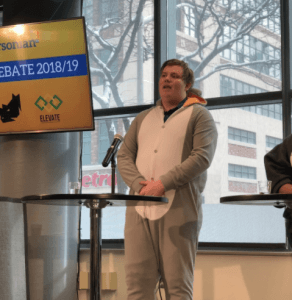By Isabelle Kirkwood
Voting for the Ryerson Students’ Union (RSU) elections begins Feb. 13 and goes until Feb. 15. The Eyeopener asked the candidates running for executive positions about their plans, policies and politics.
Responses have been edited for length and clarity.
President
The RSU president oversees the executive team and helps set its direction. There are three candidates running for president. Current RSU president Susanne Nyaga is running with Elevate, Ram Ganesh with Unify and Matthew Smith with The Rhino Party.
The Eye: What’s your major criticism of the RSU and how would you have done things differently?

Susanne Nyaga, presidential candidate with Elevate
Nyaga: I think when it comes to team development, one thing that needs to stay continuous is communication. I’d love to have more of a cohesive vision and continuously communicate amongst each other. And that’s embedded in the some of the things that Elevate wants to do next year. We’ve really started planning as a team, and we’ve already communicated the work that we’ve got to do as a team, so we’ll be able to just hit the ground running. We’ll have some folks, those who’ve been there a little bit longer like myself and [vice-president equity candidate Camryn Harlick] to support the new people coming in. I also want to work in making cohesive policies that are breaking down how our operations need to be working, so there’s no question from the people that are transitioning in and out about what the proper procedures are.
Ganesh: I look at it as a board of 43 people and I see it as a dysfunctional board. The problem stems from the fact that there is no external chair. They have been unsuccessful in appointing an unbiased chair and I think that’s where the root of all problems [is]. A lot of important motions and agendas have not passed through or a lot of bylaws have been broken during these board meetings because of the absence of an unbiased chair. And that’s the first problem I’d fix. Regardless of how these elections turn out and regardless of if it’s a split or all of Unify get in, I am hoping to bring in a chair that is unbiased and a chair that the RSU can be unanimously agree on. If I’m not capable of doing that, I will ask the team for recommendations to appoint a chair that they are comfortable with leading the meetings. And that’s number one.

Ram Ganesh, presidential candidate with Unify.
Number two: I feel like there’s a lot of infighting within the executives. The RSU is an organization that is supposed to be coming out and working for the students. I don’t see the RSU doing that. I see the RSU and the executives fighting amongst each other. I look at the issue and I see a couple of executives really pushing hard for the students, a couple executives coming out and pushing plans like U-Pass and pushing plans like a career development grant, and other executives trying to take credit for that. I feel like that is an extremely toxic environment and that is not okay.
Credit has to be taken by somebody that has actually worked on a product. And when I see these elections, you clearly see where the problems are from. It is a broken board and a broken executive and a lack of communication. When a president feels that it is okay to go ahead and publish a statement on behalf of an entire organization without consulting its board, that is a problem. I would do things differently by communicating and being more open and transparent with my board of directors.

Matthew Smith, presidential candidate with the Rhino Party.
Smith: I think the biggest criticism is just their transparency in general. We’ve been focusing a lot on financial transparency, but also just as a whole, the RSU isn’t very transparent. It’s incredibly hard to find any information about how they’re organized or how they’re run on their website. There haven’t been meeting minutes published or any board meetings or anything since the last meeting the previous board. Their budget wasn’t updated for a few months after it was approved. I’m actually not sure if it was approved considering SAGM never happened, so students never got to vote or talk about it. You don’t really know where money’s going in the RSU or how it’s being spent, and it’s just a case like with Harman Singh from two years ago with 6 Fest. There was never the final report published. No one actually knows for sure where all that money went. There’s no transparency at all with how the RSU operates.
The Eye: If there’s another split slate executive, how will you manage and make sure the RSU is still operating efficiently?
Nyaga: Last year one of the things we did, literally before we even stepped in, [was] we took a conflict resolution workshop, where we just talked about how we like to be addressed when conflicts are happening so we knew how to move forward prior to a conflict arising. I also hosted multiple [meetings] with our executive and our board team, so we could start that conversation about what kind of work we wanted to do on campus, some of the work we do before campaigning and some of the work we do with the candidates we run with.
Recreating that so that we can connect what we were running for and our visions and our plans with each other and get that work going. I would [make] sure that everyone’s on board and understands the way the organization runs, everyone understands the policies and the governance. Then we’re able to create concrete plans of how we can get that work done and how we can work together. [We would] focus a lot more on that conflict resolution piece and trying like I have this year communicate with people when conflicts arise. I can’t control how other people react to that. So, I’m still trying to put in my effort.
Ganesh: The RSU tackled a lot of problems on a day-to-day basis and I believe that each executive should be given the freedom to work on their portfolios by themselves. I will make sure that these executives are empowered and have all the resources that they need to go ahead and do their jobs, by [managing] the H.R. and providing them with the resources they need to get the job done. I will communicate a lot better, I will publish executive meeting minutes much faster and I will make sure that the directors are aware of what we as the executives should do next year.
Smith: I think the biggest issue with the split slate this year was that the two slates went in with very differing views on everything. Like Susanne and Camryn are obviously very pro-equity, pro-CFS (Canadian Federation of Students), that sort of thing. Whereas the Spark slate was more anti-CFS, more focused on Ryerson itself. So, at the very start, their views are so conflicting that I don’t think there is ever really any room for them to work together properly.
Next year, if it is a split executive which, if anyone on Rhino wins, it would have to be, because we’re not running a full slate, I think it would be more important to actually talk with all the executives and the directors before the year even begins. As soon as the elections are over, [we should] start hashing out what everyone wants to do so there’s a clear plan going in next year, [to determine]: this is what you want to do, this is what I want to do; how can we support each other, rather than fight each other on Facebook or Twitter or all these different things.
The Eye: RSU vice-president student life and events Lauren Emberson resigned this year because of professional differences and the union’s social climate, how do you plan to prevent discord on the executive and maintain a healthy work environment?
Ganesh: Lauren is a fantastic executive. I haven’t seen too many people who have worked harder than Lauren. She’s a good person from the heart and she’s an excellent executive of the RSU and Lauren resigning is a massive loss [for] the RSU and the fact that that situation wasn’t fixed is troubling. If elected, I will make sure that there is no hostile environment in the office. I will make sure that the office is a place where you come to get the work done and not share your political agenda, impose a political agenda on your fellow executives.
Smith: There was an exec that resigned this year, but there are also several directors who resigned in previous years because of the climate in the RSU. In the last three years at least, there’s been multiple slates that win for directors and execs. They don’t really tend to want to work together and they come in with this idea that one side’s been told that the other side is evil or vice versa. I think it’s more important, at least for the executives, that they bring more open conversations about what the issues are. Like with Ali Yousaf’s post last night calling out Camryn and Susanne for what he called a toxic environment; why wasn’t something done about that scenario? Why wait until almost the entire term’s over to start talking about these issues with the execs? Things like that should be brought up as soon as that happens, so the execs have time to talk amongst themselves for even bring in a third-party mediator.
Nyaga: I think every individual has a role to play when it comes to creating a healthy environment amongst ourselves. First and foremost, equity training should be at the forefront. When we’re all walking into a space with different identities, some of us might be more educated than others on oppression and how it works systemically. So, making sure that we’re providing people with that information as they’re coming into the spaces and dealing with conflicts as they arise and having conversations and trying to resolve them as a team and making sure we’re providing a safe space for folks to do their work. We’re addressing issues as they arise instead of letting them build up and get pent up but we’re communicating, we’re talking, we’re discussing.
The Eye: What are some specific plans or programs you’d like to implement during your term?
Smith: The first thing I want to do is partially revamp the website and partially revamp the way the budget is handled. Right now, the budget is created in-house entirely, for the most part it’s the executives of the budget committee who deal with the budget solely. I’d like to implement a program where there are town halls held over the summer either in-person or online to be more accessible, where students have a chance to actually voice their input on where they want money to go. And then that [can be] taken into consideration instead of just the board members and budget committees deciding.
I’d also really like to see the website revamped to be easier to find important information. I know the company that currently runs the website. I had experience with them in the past from when we were using the same posting company and provider. Their back-end is incredibly hard to use and very inefficient. And I feel like the entire website could be revamped to be a lot easier to access services [to] find out more information about equity services, highlight things like the emergency bursaries, make the budget more transparent with actual updates. I know Ram said it’s too hard to give updates on the budget, but if you can’t afford those updates online for students, how can you also afford to give it to the board members themselves? I’d like to make sure that there’s at least a monthly budget update to both the board and students as a whole, so that they can see where their money’s going.
Nyaga: I would love to see a permanent 24-hour study space. Those who launched the pilot project have already started this year. We’re going to use those stats and push administration to open up the SLC for 24 hours. The reality is that [the International Living & Learning Centre] is a great space, but it holds a lot less people and it also has a lot less services than the SLC will be able to provide. I’d also like to see a textbook loading program which Adam Asmar, our vice-president operations, is very passionate about getting started on.
Accompanying that with open educational resources as we’ve been discussing for years to come. The Ontario government is already in support of those. I also want to work towards the free breakfast program that’s going to be happening and building onto the Wellness Centre and making sure that students understand what that space is and how they can access it. We’re also holding administration accountable when it comes to some of the wellness resources Ryerson provides, to build those, so that folks aren’t waiting three weeks to three months just to access counsellors.
Ganesh: My entire team has a very large set of platform points, but two things that I’m super passionate about and when I’m campaigning, I get a lot of great responses about are nap spaces and a $5 menu at the Ram in the Rye. I personally believe that there aren’t too many clean, safe and accessible spots on campus where you can actually take a nap to recharge and go back to the next class. And I believe the students are broke, hungry and tired. I want to be able to create a nap space case on campus [and] partner with Ryerson facilities to make that happen.
I also want to create a $5 menu at the Ram in the Rye. Food insecurity is a big problem on campus and I want to address that head on. I believe that any student with a $5 bill should be able to get a plate of clean, healthy food, no questions asked. Students are paying $126 into this organization every year. The least we can do is give them clean, healthy food.
The Eye: Is there anything else you think students should know about your campaign?
Nyaga: I think students should be making informed decisions when they’re choosing who to vote for. Elevate has spent a lot of time sitting in groups, talking about the kind of work we want to do for students, talking [about] the feasibility of all of our platform points. We’ve spoken to departments we want to be collaborating with. We’ve started the groundwork, we just need the support of the RSU to complete the work, but we’ve [put] a lot of work into making sure that these are feasible, and realize the platform points that we can do in a year as a team. We also want to make sure we’re doing a long more to support the board so that the faculty specific work is also getting done, so that faculties with different issues are being homogenized into Ryerson students, but they’re actually be addressed as faculty, on an individual basis for their individual issues.
Ganesh: When we put together this entire team back in December, we made sure this team would fight for us. These 32 people did not know each other very well. They were a group of random people who are from very different socioeconomic statuses, very different faculties, programs, [and] live in different parts of the GTA. They were all brought together in one room and we gave them a black board and we said, “Go ahead, write down all of your problems that you face in school.” That led to us creating our platform points and we narrowed it down to three problems; students are broke, hungry and tired. Therefore, we created four platform points to solve these problems. We want to revitalize operations, we want to prioritize equity, we want to professionalize our student life and we want to revolutionize education. We want to get all of that done in one year.
Smith: I’ve heard from a couple students now, where they’ve been talking to people from Unify, where they’re like, “Oh yeah the Rhino party’s a joke, they don’t actually run, they’re going to just drop out and they’re don’t ever actually stick it out.” Previous years? Sure, the Rhino party’s been a bit of a joke. We haven’t taken things too seriously. Last year we kind of started a mixture of some silly memes and things, but also a combination of [campaigning on the message that] the RSU’s not transparent and we need to be more transparent this year. Everyone running is taking it seriously. We’re not just having fun, we’re not poking fun at others’ expense. We actually have real campaign points and we want to help make real change on campus. So, I just encourage students to actually take it seriously this year, and actually check out our campaign points instead of just listening to people and assuming “Oh yeah, they’re a joke.”










Leave a Reply